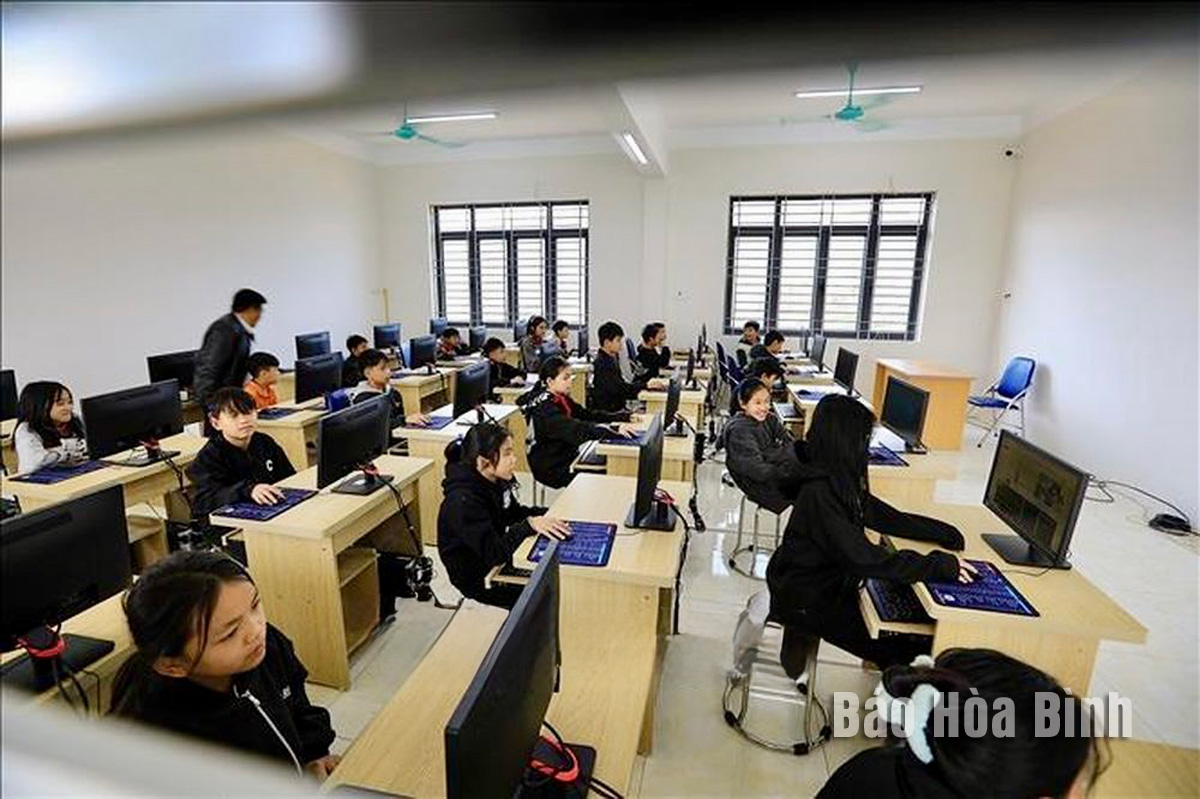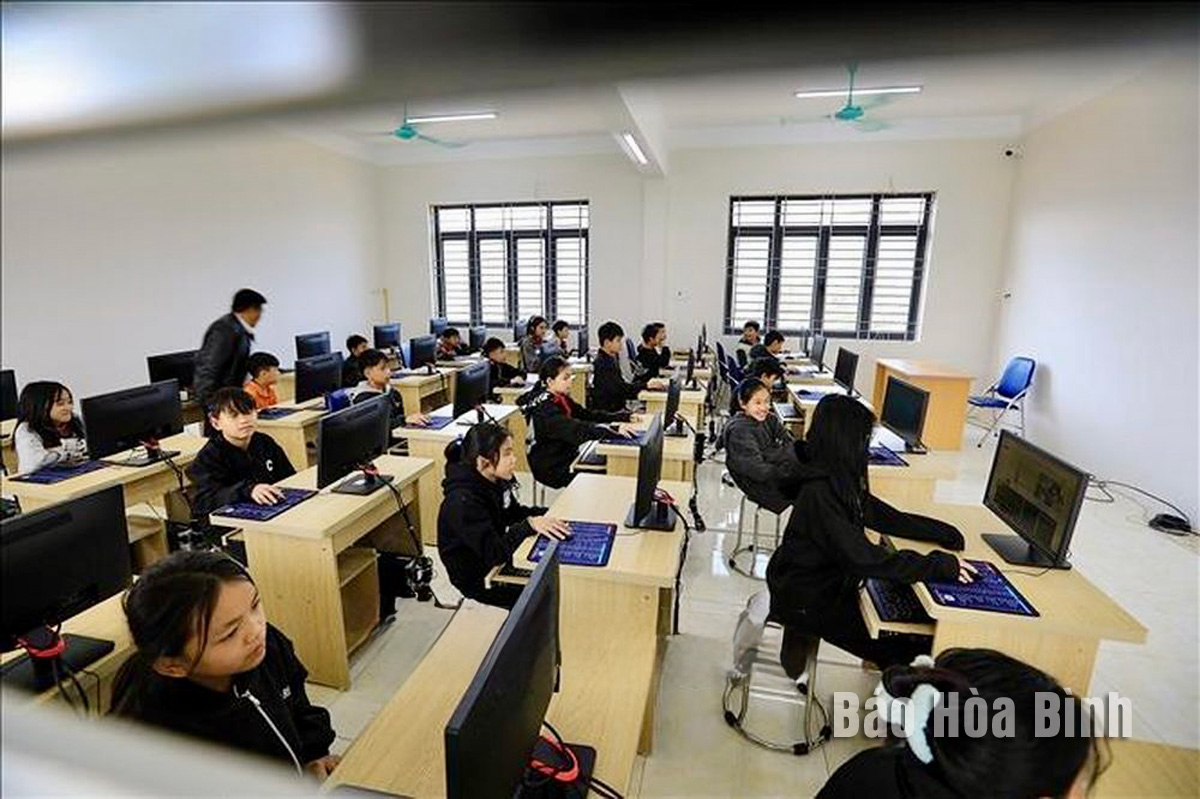
A total public investment capital of 113 billion VND (over 4.3 million USD) was disbursed for a project to upgrade infrastructure and stabilise residents in the vicinity of the Da River reservoir between 2021 and the first quarter of 2025, giving a facelift to local rural areas and improving the quality of people's life.
The Tien Phong Semi-Boarding Secondary School for
Ethnic Minority Students enjoys improved infrastructure, proving the project's
effectiveness.
Nguyen Thanh Tuan, Vice Chairman of the People's
Committee of Da Bac district, said that up to now, ten out of 11 works in the
project have been completed. The last one – the rural road in Mo Ne and Lau Bai
hamlets in Vay Nua commune – is being urgently constructed after being delayed
due to the presence of forest land, adverse weather conditions, and changes in
the compensation policy.
The project is implemented across communes, with
the office and classrooms constructed at the Tien Phong Semi-Boarding Secondary
School for Ethnic Minority Students; community learning centres built in Cao
Son, Muong Chieng, and Dong Chum communes; and irrigation systems upgraded in
Am and Moc hamlets in Nanh Nghe commune. Such works have helped local people
settle down and enhance their confidence in a bright future in new living
places.
Relocation is not just about moving people to
new places. More importantly, it is about providing them conditions to have a
safer and more sustainable life, and further develop. The infrastructure
upgrade project in the vicinity of the Da River reservoir has managed to do
that.
Each completed work marks a step towards meeting
a criterion of a new-style rural area. For examples, inter-hamlet roads help
communes meet the second criterion, the intra-field canal system is mentioned
in the third criterion on irrigation, proper schools – the fifth criterion,
houses of culture and community centres – the sixth and sixteenth criteria.
Many communes in the resettled zones such as
Tien Phong, Nanh Nghe, and Dong Chum used to struggle to develop new-style
countryside. Now, thanks to the project, the infrastructure "gaps"
have gradually been filled.
When a facility is completed, local people’s
living conditions are improved, creating a solid foundation for communes to
achieve the target on new-style rural area building.
The biggest barrier to infrastructure
improvement is forest land. Many works are located in areas planned for
forests, requiring procedures be handled to convert land use purposes. This
step is both sensitive and time-consuming. This problem caused long-lasting
delay in some works. For example, the Mo Ne - Lau Bai road in Vay Nua commune
has had its construction duration extended to 730 days from 500 days as
originally planned.
In addition, adverse weather conditions pose a
major challenge. Typhoon Yagi in 2024 damaged newly-completed roads and
prevented the transportation of equipment and machines to construction sites.
Nguyen Thanh Tuan, Vice Chairman of the People's
Committee of Da Bac district, said that facing such barriers, the locality and
construction units have persistently proposed adjustments, kept a close watch
on the actual situation, found ways to maintain progress, and made efforts to
complete construction before the rainy season.
Thanks to joint efforts, public investment
capital has been used properly, generating positive results and benefiting
local communities.
The emulation movement "Hoa Binh joining hands to build new-style rural areas” has been widely spreading, becoming a driving force that motivates the localities to renew rural landscapes and improve the material and spiritual lives of the residents. In this movement, the people play a central role-both as the main implementers and direct beneficiaries of its outcomes.
In response to the global digital revolution, Hoa Binh Newspaper is transforming itself into a modern and multi-platform media hub, blending cutting-edge technology with a restructured newsroom and a new generation of tech-savvy journalists.
Hoa Binh province’s Association of the Elderly recently held a conference to review the project on expanding the inter-generation self-help club model until 2025.
In a move to implement Resolution No. 57-NQ/TW, issued on December 22, 2024 by the Politburo, which targets breakthroughs in science-technology development, innovation, and digital transformation, the Hoa Binh provincial Department of Health has issued a plan to roll out the "Digital Literacy for All” campaign within the local health sector.
An Nghia Commune (Lạc Sơn District) is one of the communes that achieved the tha standard of the national new rural area in 2018. Entering a new development phase, the commune is now trying to meet the criteria for the advanced new rural development. With the strong political will and the public consensus, the commune is gradually overcoming the challenges to reach this goal, aiming for the sustainable development.



